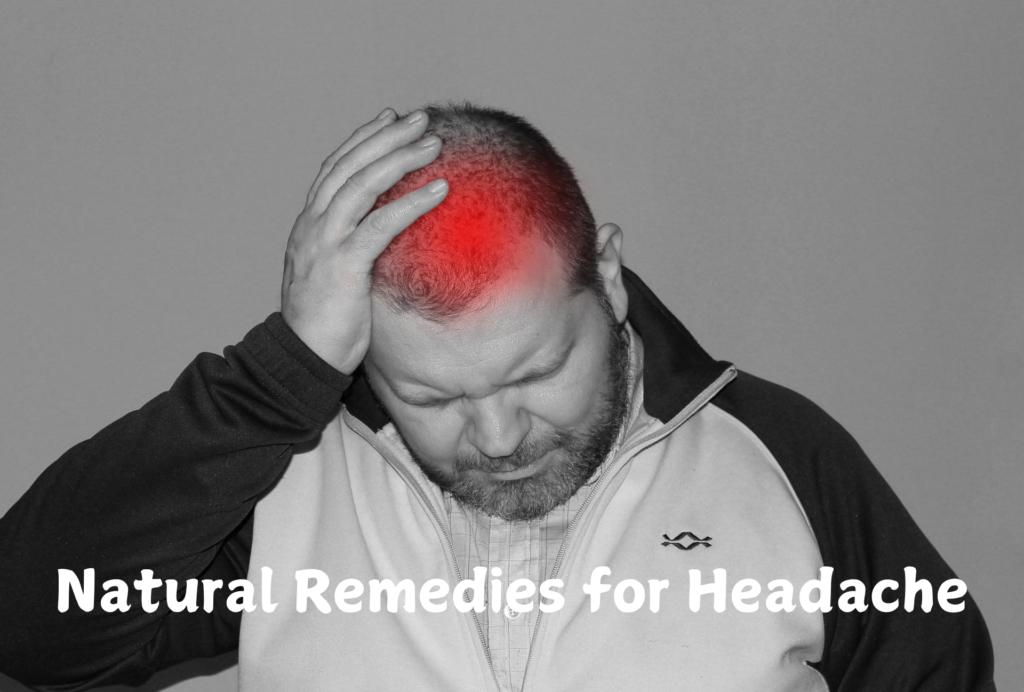Headaches are one of the most common health complaints, affecting millions of people worldwide. Whether it’s a tension headache, migraine, or sinus headache, the throbbing pain can disrupt your daily life. While over-the-counter medications can provide relief, many people are turning to natural remedies for headaches as a safer and more holistic alternative. In this comprehensive guide, we’ll explore the best natural remedies for headaches, backed by science and traditional practices, to help you find relief without relying on pharmaceuticals.
Table of Contents
Understanding Headaches: Types and Causes
Headaches are one of the most common medical conditions, affecting people of all ages and backgrounds. They can range from mild discomfort to severe, debilitating pain. Understanding the different types of headaches and their causes is essential for effective treatment and prevention. Headaches are typically categorized into two main types: primary headaches and secondary headaches.
Primary Headaches
Primary headaches are not caused by an underlying medical condition. They are the result of overactivity or issues related to pain-sensitive structures in the head, such as muscles, nerves, and blood vessels. The most common types of primary headaches include:
- Tension Headaches
- Symptoms: A dull, aching sensation around the head, tenderness in the scalp, neck, and shoulder muscles, and a feeling of pressure or tightness.
- Causes: Stress, muscle tension, poor posture, eye strain, and fatigue are common triggers. Tension headaches are the most prevalent type of headache and can be caused by emotional stress or physical strain.
- Duration: They can last anywhere from 30 minutes to several hours.
- Migraines
- Symptoms: Intense, throbbing pain often on one side of the head, sensitivity to light and sound, nausea, vomiting, and visual disturbances (aura) in some cases.
- Causes: Migraines are believed to be related to changes in brain chemicals, specifically serotonin and dopamine, as well as the dilation of blood vessels. Common triggers include certain foods, hormonal changes, stress, lack of sleep, and environmental factors such as bright lights or strong smells.
- Duration: Migraine attacks can last anywhere from 4 to 72 hours and may occur with varying frequency.
- Cluster Headaches
- Symptoms: Excruciating pain, typically around one eye or one side of the head, accompanied by redness or tearing of the eye, nasal congestion, and restlessness.
- Causes: The exact cause is unclear, but cluster headaches may be linked to abnormalities in the hypothalamus, the part of the brain that controls circadian rhythms. Alcohol, smoking, and certain medications can trigger attacks.
- Duration: These headaches occur in clusters, lasting weeks or months, with each individual headache lasting from 15 minutes to 3 hours. They tend to occur at the same time each day.
Secondary Headaches
Secondary headaches are caused by underlying medical conditions, and the headache itself is a symptom of another health issue. These headaches can be more serious and may require medical attention. Common causes of secondary headaches include:
Causes: Cervicogenic headaches result from structural issues in the cervical spine (neck), such as herniated discs, joint dysfunction, or muscle tight
Sinus Headaches
Symptoms: A deep, constant pain in the forehead, cheekbones, or bridge of the nose, often accompanied by nasal congestion, runny nose, fever, and facial swelling.
Causes: Sinus headaches are caused by inflammation of the sinuses (sinusitis), which can occur due to infections, allergies, or other irritants.
Duration: They typically last as long as the sinus infection or inflammation persists.
Medication Overuse Headaches (Rebound Headaches)
Symptoms: A constant, dull headache that often worsens upon waking and can last all day.
Causes: Overuse of pain-relieving medications, including over-the-counter drugs such as aspirin, ibuprofen, and acetaminophen, can lead to rebound headaches. The body becomes dependent on the medication, and withdrawal can trigger pain.
Duration: These headaches persist as long as the medication is overused and may require gradual discontinuation of the drug.
Headaches Due to Head Injuries
Symptoms: Vary depending on the severity of the injury but can include throbbing pain, dizziness, confusion, and sensitivity to light and sound.
Causes: Headaches following a traumatic brain injury (TBI), such as a concussion, are common. They may develop shortly after the injury or take days to manifest.
Duration: Headaches from head injuries can be short-lived or persist for weeks or months (post-traumatic headaches).
Cervicogenic Headaches
Symptoms: Pain that originates in the neck and radiates to the head, often affecting one side. It may also cause shoulder or arm discomfort.
2. Why Choose Natural Remedies for Headaches?
Natural remedies offer several advantages over conventional medications:
- Fewer Side Effects: Unlike pharmaceuticals, natural remedies are less likely to cause adverse reactions.
- Holistic Approach: They address the root cause of headaches, such as stress or dehydration, rather than just masking symptoms.
- Accessibility: Many natural remedies use ingredients you already have at home.
- Cost-Effective: They are often more affordable than prescription or over-the-counter drugs.
3. Top Natural Remedies for Headache Relief
1. Hydration: The Simplest Solution
Dehydration is a leading cause of headaches. When your body lacks water, your brain temporarily contracts, causing pain.
- How to Use: Drink a glass of water at the first sign of a headache. Aim for 8-10 glasses of water daily to prevent dehydration-related headaches.
- Tip: Add a pinch of Himalayan salt or a slice of lemon to enhance hydration.
2. Essential Oils for Headache Relief
Essential oils are a popular natural remedy for headaches due to their calming and pain-relieving properties.
- Peppermint Oil: Apply diluted peppermint oil to your temples and forehead. Its cooling effect can ease tension headaches.
- Lavender Oil: Inhale lavender oil or apply it to your pulse points to reduce stress and migraine symptoms.
- Eucalyptus Oil: Ideal for sinus headaches, eucalyptus oil can clear nasal passages and reduce inflammation.
3. Herbal Teas: Nature’s Soothing Elixir
Herbal teas are a gentle way to alleviate headaches while promoting relaxation.
- Chamomile Tea: Known for its calming properties, chamomile can relieve tension headaches.
- Ginger Tea: Ginger has anti-inflammatory properties that can reduce migraine pain.
- Peppermint Tea: Helps relax muscles and improve blood flow, easing headache symptoms.
4. Magnesium-Rich Foods
Magnesium deficiency is linked to migraines and tension headaches. Incorporating magnesium-rich foods into your diet can help.
- Sources: Leafy greens, nuts, seeds, whole grains, and dark chocolate.
- Supplementation: Consider a magnesium supplement after consulting your doctor.
5. Ginger: A Powerful Anti-Inflammatory
Ginger is a natural anti-inflammatory that can reduce headache pain and nausea.
- How to Use: Chew on a small piece of fresh ginger, drink ginger tea, or take ginger supplements.
6. Cold and Hot Compresses
Temperature therapy can provide quick relief for headaches.
- Cold Compress: Apply a cold pack to your forehead or neck to numb pain and reduce inflammation.
- Hot Compress: Use a warm towel or heating pad to relax tense muscles and improve blood flow.
7. Acupressure and Massage
Acupressure targets specific points on the body to relieve headache pain.
- Pressure Points: Massage the space between your thumb and index finger or the base of your skull.
- Scalp Massage: Gently massage your scalp to improve circulation and reduce tension.
8. Yoga and Stretching
Yoga and stretching can relieve tension headaches by relaxing tight muscles and improving posture.
- Poses to Try: Child’s Pose, Cat-Cow Pose, and Forward Fold.
- Breathing Exercises: Practice deep breathing to reduce stress and promote relaxation.
9. Adequate Sleep and Stress Management
Poor sleep and high stress levels are common headache triggers.
- Sleep Tips: Aim for 7-9 hours of quality sleep each night. Maintain a consistent sleep schedule.
- Stress Management: Practice mindfulness, meditation, or journaling to reduce stress.
10. Apple Cider Vinegar
Apple cider vinegar (ACV) is a versatile remedy that can help balance the body’s pH levels and reduce headache symptoms.
- How to Use: Mix 1-2 tablespoons of ACV in a glass of water and drink it. You can also inhale the steam by adding ACV to hot water.
11. Caffeine in Moderation
Caffeine can both cause and relieve headaches, depending on the amount consumed.
- How to Use: A small amount of caffeine (like a cup of coffee or tea) can constrict blood vessels and reduce headache pain. However, avoid excessive caffeine, as it can lead to rebound headaches.
12. Butterbur and Feverfew Supplements
Butterbur and feverfew are herbal supplements known for their migraine-preventing properties.
- Butterbur: Reduces inflammation and stabilizes blood flow to the brain.
- Feverfew: Prevents migraines by reducing serotonin levels and inflammation.
- Note: Consult a healthcare provider before using these supplements, especially if you’re pregnant or taking other medications.
13. Aromatherapy
Aromatherapy uses the power of scent to relax the mind and body, reducing headache symptoms.
- How to Use: Diffuse essential oils like lavender, peppermint, or eucalyptus in your home or workspace.
- Tip: Combine aromatherapy with deep breathing exercises for maximum relaxation.
14. Turmeric: The Golden Spice
Turmeric contains curcumin, a compound with potent anti-inflammatory and antioxidant properties.
- How to Use: Add turmeric to your meals, drink turmeric tea, or take turmeric supplements.
- Tip: Combine turmeric with black pepper to enhance its absorption.

4. Lifestyle Changes to Prevent Headaches
Preventing headaches often requires long-term lifestyle adjustments:
- Maintain a Balanced Diet: Avoid processed foods, caffeine, and alcohol, which can trigger headaches.
- Exercise Regularly: Physical activity improves circulation and reduces stress.
- Stay Hydrated: Drink plenty of water throughout the day.
- Limit Screen Time: Reduce eye strain by taking breaks from screens.
- Practice Good Posture: Avoid slouching to prevent tension headaches.
- Create a Relaxing Environment: Reduce noise, bright lights, and strong smells in your surroundings.
5. When to Seek Medical Attention
While natural remedies can be effective, it’s important to consult a healthcare professional if:
- Your headaches are severe or frequent.
- You experience sudden, intense pain.
- Headaches are accompanied by fever, confusion, or vision changes.
- Over-the-counter medications and natural remedies provide no relief.
6. FAQs About Natural Remedies for Headaches
Q1: Can dehydration cause headaches?
Yes, dehydration is a common cause of headaches. Drinking water can often provide quick relief.
Q2: Are essential oils safe for headaches?
Yes, when used properly. Always dilute essential oils with a carrier oil before applying them to the skin.
Q3: How long does it take for natural remedies to work?
The effectiveness varies. Some remedies, like hydration or cold compresses, can provide relief within minutes, while others, like dietary changes, may take longer.
Q4: Can stress cause headaches?
Yes, stress is a major trigger for tension headaches and migraines. Managing stress through relaxation techniques can help prevent headaches.
Q5: Are there any risks to using natural remedies?
While natural remedies are generally safe, some may interact with medications or cause allergic reactions. Always consult a healthcare provider before trying new remedies, especially if you have underlying health conditions.
7. Conclusion
Headaches don’t have to control your life. By incorporating these natural remedies for headaches into your routine, you can find relief and prevent future episodes. From staying hydrated to using essential oils and practicing yoga, these holistic approaches address the root causes of headaches without the side effects of medications. Remember, consistency is key, and making long-term lifestyle changes can significantly reduce the frequency and intensity of headaches.
If you’ve tried natural remedies without success or experience severe symptoms, don’t hesitate to seek medical advice. Your health and well-being are worth it!
By following this guide, you’ll be well-equipped to tackle headaches naturally and improve your overall quality of life. Share this post with friends and family who might benefit from these tips, and let us know your favorite natural remedy in the comments below! 😊
This extended version provides even more detailed information, additional remedies, and practical tips to help your readers effectively manage and prevent headaches naturally. Let me know if you’d like further adjustments!

